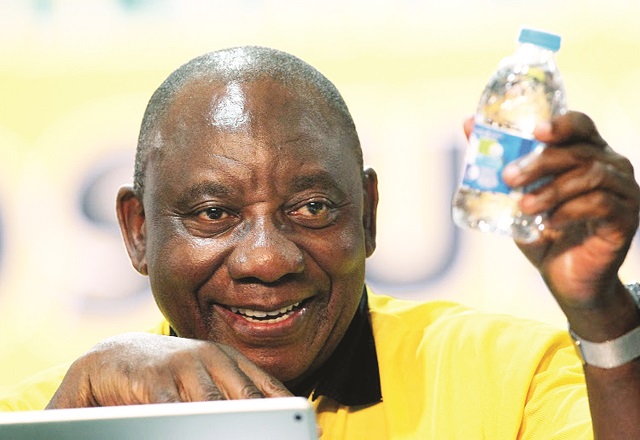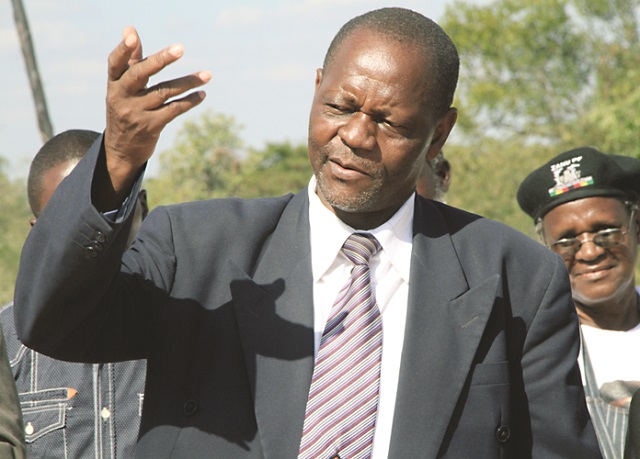Against all odds Ramaphosa emerges victorious
Lovemore Ranga Mataire
Much to the chagrin of some ANC supporters, Cyril Ramaphosa, known for his role in the negotiations that ushered freedom to South Africa, on Monday became the new governing party’s leader.
Until recently, it appeared as though former African Union commission chairperson Nkosazana Dlamini-Zuma was just a heartbeat away from the throne after being endorsed by the party’s Women’s League and the Youth League.
However, the tide seemed to have changed when the media ran awash with reports of Dlamini-Zuma’s alleged association with some individuals known for racketeering and smuggling. Her endorsement by ex-husband Jacob Zuma, who had become more of a divisive figure within the ANC did not help matters.
More than 4 700 delegates cast their ballots in a marathon voting session that started late on Sunday and continued mid-morning Monday.
Ramaphosa won with 2 446 votes beating Dlamini-Zuma who garnered 2 261.
He will replace President Jacob Zuma as ANC president and will certainly run as the party’s presidential candidate when South Africa takes to the polls in 2019.
Ramaphosa’s leadership opens the possibility for the new executive recalling President Zuma from his current position as leader of government over a number of graft allegations that have affected his tenure as president.
The race to the elective conference was plagued by fierce contestations with many predicting a possible split of the party if any of the main contenders was to lose.
However, judging by the body language of the losing candidate Dlamini-Zuma who went on to embrace her main rival Ramaphosa, the prospects of a split are next to none.
The victory by Ramaphosa was interpreted by many of his supporters as a vindication of his resolute leadership after losing out to former President Thabo Mbeki in deputising founding President Nelson Mandela.
Many will remember that historic moment in South Africa, which was broadcast throughout the world when Nelson Mandela walked out of prison holding hands with Winnie Mandela with the other hand fist in the air.
In that historic unforgettable footage, Ramaphosa is seen among a close group of people flanking Mandela triumphantly.
Ramaphosa seemed to be on the ascendency as he became the ANC secretary general the following year at the party’s national conference in Durban.
But tensions soon ensued as it emerged that both Mbeki and himself were eying the deputy presidency on divergent paths during the liberation struggle.
Mbeki was a favourite of the revered Oliver Tambo and was groomed in exile to be the heir. On the other hand, Ramaphosa was a founder member of the National Union of Mineworkers and became its first secretary general, a position in which he fashioned himself as a formidable leader in the struggle against apartheid.
Mbeki was to emerge as the victor as Mandela compromised and his preferred candidate lost out.
Bruised and battered, Ramaphosa stayed in the ANC National Executive Committee (NEC), getting the most votes at the 1997 national conference. He maintained his clean image by staying out of the many wrangles which beset the party since his departure.
In 2001 he was drawn into bizarre allegations, along with Tokyo Sexwale and Mathews Phosa in a plot to overthrow Mbeki. While the other two showed their anger at Mbeki and his allies for concocting the allegations, Ramaphosa generally stayed out of the fray.
Ramaphosa further refused to be drawn back to ANC senior leadership during the Mbeki-Zuma battle. He concentrated on building his own business empire and became more of a political recluse. That was a strategy that was to boost his profile at Mangaung when Deputy President Kgalema Motlanthe refused to accede to pressure from President Jacob Zuma to strike a no-contest leadership deal to maintain the status quo.
As a way of hitting back at Motlanthe, the Zuma camp opted on Ramaphosa as a game-changer and a worthy candidate and someone who would buttress up Zuma’s waning leadership. That choice of Ramaphosa was to prove to be Zuma’s nemesis.
Ramaphosa projected himself as the efficient and incorruptible bureaucrat in light of the numerous allegations levelled against President Zuma.
While the Marikana massacre in which he was one of the board members of Lonmin Mine might have dented his presidential ambitions, his opponent’s association with President Zuma was more damaging.
The conference outcome proved beyond doubt that delegates detested some kind of Zuma dynasty unfolding if Dlamini-Zuma, President Zuma’s ex-wife was to be elected new ANC leader.
Dlamini-Zuma’s name was also dragged into an investigation by UK authorities as a person close to alleged financial crimes committed by the Gupta and Zuma families. Besides the three Gupta brothers, a British law maker has flagged her as part of 27 people UK financial institutions should review as a possibility of being involved in despicable financial activities.
The question that remains within the ANC is whether the new leader will be able to glue together the fractious individuals in the top six. The unusual number of those that were vying for the President position have also been questioned by many analysts who described it as an unparalleled insatiable appetite for power.
The elective conference was also telling in its lack of gender parity where only two women made it into the top six. One thing for sure, the ANC will never be the same. Ramaphosa is seen as a darling of the dominant industrial architects and is more likely going to pander to the whims of white monopoly capital.
It remains to be seen how Ramaphosa will balance the pressure from his other comrades calling for a radical economic transformation and appropriation of land without compensation.











Comments